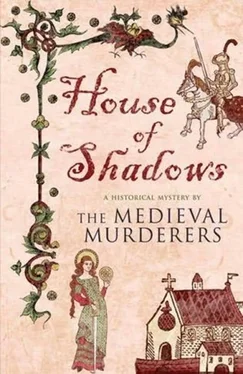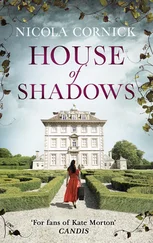‘But Brother James told the truth in his dying testament? He described how the cross had actually been found – or planted.’
‘Yes. Before he died he wanted to set the record straight. His conscience pricked him as he was preparing for his deathbed. I do not know whether he wished the testament to be sealed up with his bones or whether it was done on the orders of the prior at the time – or, indeed, whether it was no more than chance that everything was buried together. But the secret rested with him until it was uncovered by two masons carrying out some workaday repairs.’
‘How many others know of the testament?’
‘A handful. Brother Peter, who keeps the library. He has been agitated about it and keeps badgering the prior. Prior Dunton himself, of course. But this is not something to share with the brotherhood at large. We should not disturb belief without good reason. Those who know will say nothing. I am relying on you to say nothing, Geoffrey.’
‘And the Morton brothers cannot speak for they are both dead.’
‘Coincidence. One was killed in a brawl by a reprobate who has done away with himself, pricked by his conscience.’
Chaucer raised his eyebrows. Seeing his scepticism, Brother Michael said: ‘Who can tell what a man in extremis will do, except that they will be great and terrible things? And the other brother has died of natural causes, you say. He was a sick man. I saw him white and shivering in the graveyard. For sure, he caught his death in that vault beforehand.’
He did catch his death on account of that place, thought Chaucer, but perhaps not quite in the sense that you mean. He remembered the man on the bed, the great bolster pressed down hard over his gaping mouth. It was…convenient…that all those lay persons who were aware of Brother James’s testament were not around to blab of it. But to Brother Michael he said nothing of his suspicions.
‘So the matter is closed now?’ said the cellarer.
‘It seems so.’
Brother Michael sighed again, this time with satisfaction. He clenched his fist around the ring, which, throughout the conversation, he had been rolling between the thumb and forefinger of his left hand. Then he held out his right. Geoffrey extended his. The monk might have been plump and somehow soft-looking, but he had a strong grip and held Geoffrey’s hand for a fraction longer than necessary as if to reinforce his words. Then the cellarer said that they would no doubt meet at supper in the refectory, and Geoffrey took his leave.
When Geoffrey agreed with Brother Michael that the matter was closed, he did so because there seemed to be no prospect of discovering any more from the cellarer. Chaucer regarded himself as a fairly shrewd judge of people and considered that Michael had given him all that he knew, after an initial show of reluctance – the monk’s reluctance understandable because the affair of the false cross – or, more precisely, the false legend of its appearance – did not reflect well on the priory. There was an irony, however, in the fact that even if the ‘truth’ became widely known it would probably make little difference to the value and attraction of the relic. Why, the prior himself already seemed to have reverted to the legend, judging by what he’d told Geoffrey the previous day. In the same way he’d jumped to the convenient conclusion that the death of the claw-handed Adam was a suicide.
As Brother Michael had said, people convince themselves of what they need to believe.
All of this, however, did not necessarily clear up the three deaths – of the Morton brothers and Adam. If Chaucer hadn’t witnessed for himself the stifled corpse of Simon, he might have accepted that the business was finished. It was like a tapestry in which each of the threads was neatly woven to make up a picture, albeit a crude one. Adam had killed John because he was a violent, bad man, and then done away with himself in contrition. Meanwhile, Simon had died from natural causes – an impression that Chaucer had done nothing to counter. In reality, the tapestry wasn’t finished. There were some loose threads.
One of the threads was to do with the circumstances of Adam’s ‘suicide’. Geoffrey didn’t accept that the man could have hanged himself. He could not have assembled the noose and slipped it over his neck with a withered hand. Then there was the strange episode when Chaucer had been shut up in the vault beneath the cellarer’s quarters. Someone had slammed the door and turned the key and run away. But why? To give him a fright? To keep him out of the way? Or even as a roundabout way of disposing of him?
Yet it was something else that tugged at Geoffrey’s thoughts as he wandered about the priory grounds. It was late afternoon. In the distance, to the south and beyond the flat river lands, the Surrey hills could be glimpsed through the haze. Chaucer struggled to pin down what was bothering him.
It was to do with the testament that had been written (or dictated?) by Brother James as he neared his death while his conscience was pricking him. The testament told the true story of the Bermondsey cross. A testament now destroyed by Brother Michael. No one would ever read it again. Perhaps Brother James had never intended it to be read in the first place. Merely writing it down would have been sufficient to clear his conscience. The document would have been penned in Latin, of course. Latin was the language of monks and priests and other learned persons. Geoffrey himself had translated work from Latin. That ancient language was the natural choice of educated people, especially two centuries ago. It could not be understood by the common folk, which was one reason for using it.
Yet the masons, Simon and John Morton, had somehow grasped the contents of James’s testament. How had they managed that? Only through one of the Bermondsey monks, surely. Yet none of the monks would have revealed the secrets of a dangerous document to a couple of artisans. Rather they would have gone to some lengths to keep it out of their hands, as was shown by Brother Michael’s willingness to pay the Mortons for the recovery of the testament.
So, if not one of the monks, who might have deciphered the Latin document – or at least made some rough sense out of it? And he suddenly recalled what he’d been told of Mistress Susanna Morton. That she gave herself airs, that she was a cut or two above the other womenfolk dwelling near the river. That she was reputedly the illegitimate daughter of a priest. Priests could read and write Latin. Was it possible that a priest who’d fathered a child might – out of guilt or a sense of responsibility or even out of affection – have tried to foster some learning in that child of his? Have tried to pass on the rudiments of another language, of Latin? Could it have been Mistress Morton who had unpicked the secret of the testament and told her husband or the brother-in-law, who had in turn taken their knowledge to Brother Michael in the hope of gaining by it?
Chaucer struggled to recall Mistress Morton’s words when he’d escorted Will home and given her the news of John’s death. She evidently regretted something. She’d said, ‘I wish I hadn’t picked out…’ before breaking off. He’d assumed she was referring to some object, perhaps the ring Will had presented to him. But supposing she’d meant to say ‘I wish I hadn’t picked out the words’? The words of Brother James’s testament, the words that revealed the truth of the miracle of the cross.
Had she passed the secret on, or fragments of it, to her husband and her supposed lover?
If so, they hadn’t gained much by it, as Michael had pointed out. They would shortly be buried in the graveyard. But Mistress Morton was still alive…
And at once Geoffrey Chaucer turned around and half-ran through the inner court and then the outer one. As he passed through the gateway, two thoughts flashed through his head: firstly, that he was not created for running and was already out of breath, and, secondly, that he must reach the Morton house before Mistress Morton, too, was murdered.
Читать дальше












